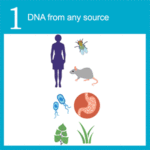Viruses that infect bacteria, or phages, are continually evolving ways to target and exploit their specific hosts. Their bacterial hosts, in turn, are continually evolving means to evade the phages. These perpetual battles for survival yield incredibly diverse molecular arsenals that researchers are itching to study, yet doing so can be tedious and labor-intensive.
A team led by Berkeley Lab scientists has developed an efficient and inexpensive new method to gain insight into these defensive strategies. They reported in PLOS Biology that a combination of three recently developed techniques can reveal which bacterial receptors phages exploit to infect the cell, as well as what cellular mechanisms the bacteria use to respond to a phage infection.








